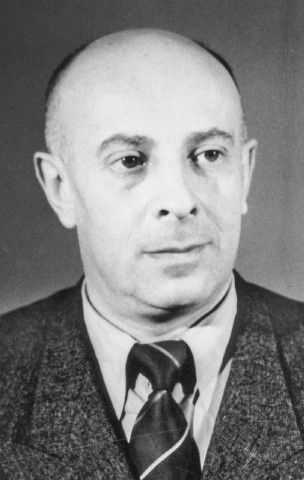Yuli Meitus
(Юлій Сергійович Мейтус, Юлий Сергеевич Мейтус, Yuliy Meitus, Julij Mejtus, Iouli Meïtous)
Yuli Sergeievich Meitus was born on 28 January 1903 in Elisavetgrad (at that time: Russia, today: Kropyvnytskyi, Ukraine). He first studied piano with Heinrich Neuhaus at the local music school and graduated there in 1919. Yuli Meitus then continued his studies at the Kharkiv Music Academy under Semyon Bogatyrev. During his study times Yuli Meitus was also interested in Jazz music and it is known that he founded one of the first jazz bands in the (just constituted) USSR in 1924. They performed at the Berezil Theatre of Les Kurbas. Since 1926 Yuli Meitus also worked together with Les Kurbas and composed at total of 13 works for plays at the Berezil Theatre. This ended abruptly with the closing of the Berezil Theatre in 1933, due to the production of plays that failed the official Soviet propaganda policy. Meanwhile Yuli Meitus had finished his studies at the Kharkiv Music Academy in 1931.
After his studies Yuli Meitus focused on a career as a composer. First compositions were chamber music and five orchestral suites between 1927 and 1944, but it became more and more obvious that Yuli Meitus had a special interest and talent for operas. He composed his first opera "Perekop" in 1939 together with Vsevolod Rybalchenko and Mykhailo Tits, and the trio composed another one - "Haydamaki" - in 1941. During World War II Yuli Meitus fled to Ashgabat (Turkmenistan). There he composed the opera "Agaban" together with Ashir Kuliev in 1943, which is considered to be the first Turkmen opera. For this achievment Yuli Meitus was named a Honoured Artist of Turkmenistan in 1944. A second cooperation with Turkmen composer Danatar Ovezov led to the opera "Leila and Majnun" (1946). After World War II Yuli Meitus moved back to the Ukrainian territory and settled in Kyiv. His first own opera "The Young Guard" was composed in 1947 and brought him the title Merited Artist of the Ukraine. In the following decades Yuli Meitus continued to compose mainly operas, which in the end led to a total of 17 operas. For this reason he is considered as the founder of the modern Ukrainian opera. Yuli Meitus was honoured for this achievement as People's Artist of the Ukraine in 1973 and finally awarded the Shevchenko National Prize in 1991.
Yuli Meitus died on 2 April 1997 in Kyiv (Ukraine).
The work catalogue of Yuli Meitus contains 17 operas, which can be considered as his most important and main output. In addition he composed more than 300 songs of words by several Ukrainian and Russian poets, the cantata "Oath" and three sets of "5 Ukrainian folk songs" for voice or choir and orchestra. On the other hand his work catalogue contains only few instrumental compositions: 5 orchestral suites, a Turkmen symphony, the symphonic poem "On the way to glory", an Overture for orchestra, the cantata "Oath", Variations on a Ukrainian theme for violin and piano, Allegro for violin and piano, Nocturne for violin and piano, "In the Carpathians" for piano and Twelve pieces for children for piano. Yuli Meitus also composed several film music, for example "The Night Coachman" (1927), "Ivan" (1932, together with Borys Lyatoshynsky), "The Old Fortress" (1937) or "Makar Nechay" (1940).
5 Ukrainian folk songs for voice and orchestra
In my possession is the autograph full score of the composition "5 Ukrainian folk songs for low voice and orchestra" (5 українських народних пісень для низького голосу з оркестром) by Yuli Meitus. The work was composed in 1934. The work belongs to a set of orchestrations of Ukrainian folk songs: The first set is scored for low voice and orchestra (1934), the second set is scored for high voice and orchestra (1937) and the third set is scored for choir and orchestra (1939). Each set contains 5 different Ukrainian folk songs.
In several internet ressources about Yuli Meitus the title of the five songs from the 1934 work for low voice and orchestra is given as: 1. А на завтра неділенька, 2. Ой, там за ярочком, 3. Вітер, вітер коло хати, 4. Ой, матінко-зірко and 5. Ви, музики, грайте. But that does not correspond to my manuscript. The autograph provides the following titles:
- Про стару солдатчину
- Ой, там, за ярочком...
- Вітер, вітер коло хати
- Строкова пісня
- Ви музики грайтє
full score:
orchestral parts:
